A Day of Classes While Studying Abroad at Universidad Veritas in San José, Costa Rica
When researching about study abroad or speaking to those who have done it, I found very little discussion on the actual “studying” aspect. It’s great to know the weekend travel and excursion possibilities, but it is hard to find out what one actually does during the week. That’s what I’m here to do—today I’ll be explaining a full day at school abroad.
I am currently attending Universidad Veritas in San José, Costa Rica. While it is quite different from my university in the States, I feel as if I am learning so much and connecting with both my professors and peers more than ever before. Each day I wake up excited to attend class and feel engaged throughout the entire duration.
Universidad Veritas has an amazing Spanish-learning program that caters to all levels. Whether you have not taken a Spanish class since elementary school, like me, or if you have a proficient understanding, there are classes to fit one’s abilities. The classes are in four-week terms, and students can choose whether they only want to take one class in January or continue through the rest of the months of the semester.
All classes take place Monday through Friday beginning at 9am and ending at 12pm. While this sounded quite daunting to me at first, time actually flies. Students are also not in the classroom the entire time, as there is a 30-minute break at 10:30am each day for us to walk around, speak to our peers, or even grab a coffee and snack. Time in the classroom goes by fast due to the interactive nature of the class.
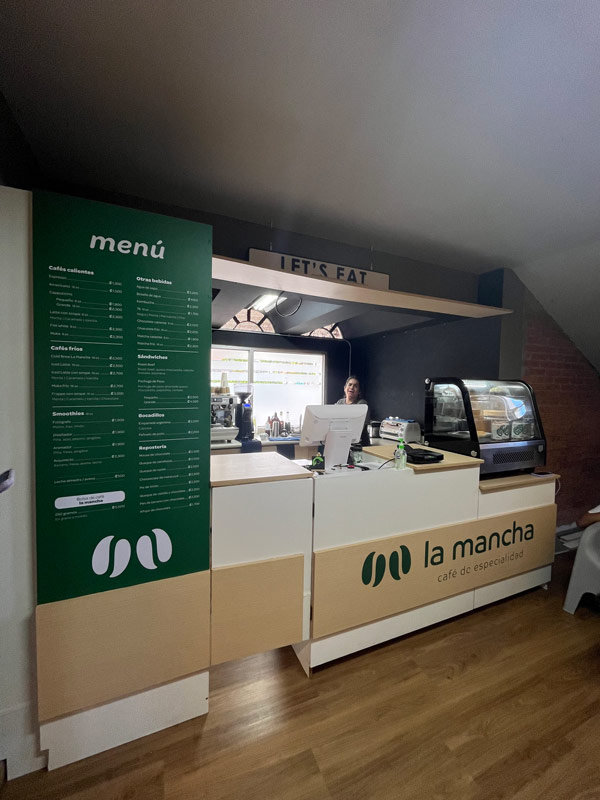
The coffee shop at Universidad Veritas I go to admittedly almost every day during our break. My personal favorite is an iced vanilla latte with oat milk!
Because of my little knowledge of Spanish prior to coming to Costa Rica, I was placed in the Basic 1 class, which covers grammar and conversation. I just completed the four weeks, and I already feel much more confident in my Spanish. Class varied day-to-day, and it never became boring. There was some lecture, some in-class work in a workbook, group collaboration, projects, and more.
For someone who struggles with test performance and anxiety like me, this class, and all classes at Veritas for that matter, are great. You are tested on your knowledge through “sociodramas,” presentations, and participation in class. This is super helpful because it allows you to continuously practice speaking the language.
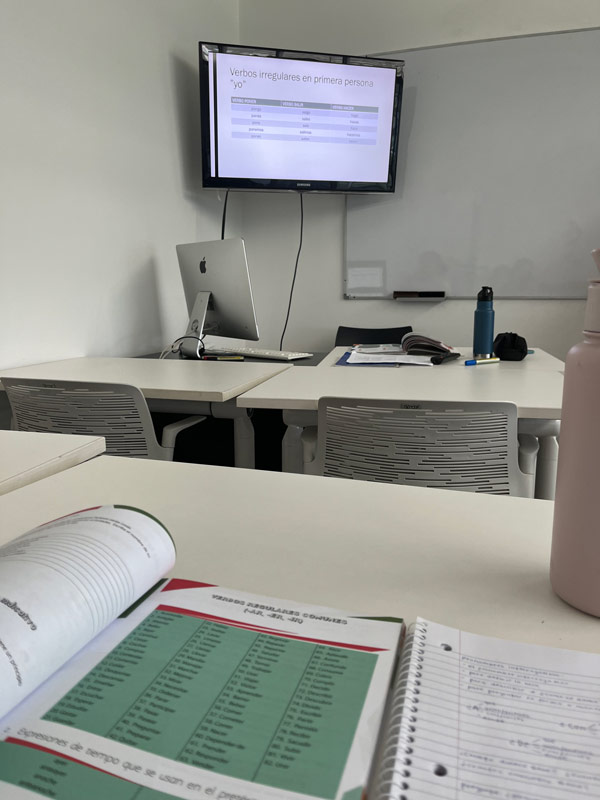
Discussing irregular verbs in Spanish Basic 2. The workbooks we are provided also consist of several notes to aid us!
Sociodramas consist of a pair or group of students conversing in Spanish in front of the class on various topics. For example, one of the sociodramas we did was a group dining at a restaurant with one person acting as the server. This greatly helped me with ordering at real restaurants here.
For the presentations, we made slideshows about different topics, like our communities or our favorite seasons. My favorite was planning a trip to a location in Costa Rica, providing information about transportation, lodging, and activities planned. We were only allowed to have a few words on the slide, so practicing the presentation really helped enforce the vocabulary and grammar into my brain. I decided to continue onto the next level to improve my Spanish even more. It is only week one, but I already feel as if I have learned so much more!
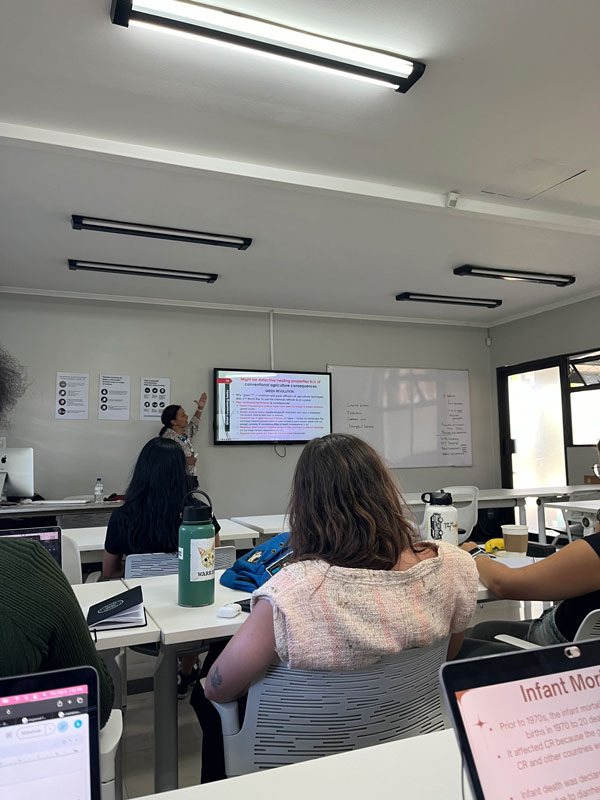
Listening to my professor’s presentation.
I am taking two other classes during my time in Costa Rica—one of which is called “Sustainable Lifestyles: The 9 Dimensions of Healthy Living.” In this class, we are learning all about well-being and how to improve ours. Each week we cover a new dimension of healthy living, giving presentations to the class about the different sectors. For example, last week we covered physical health, so there were presentations about topics like nutrition, sleep, and exercise. The aspect I enjoy the most about this class is the group discussions. We all explain the topics in greater depth and relate them to our personal lives. It is amazing how vulnerable we became with each other so soon!
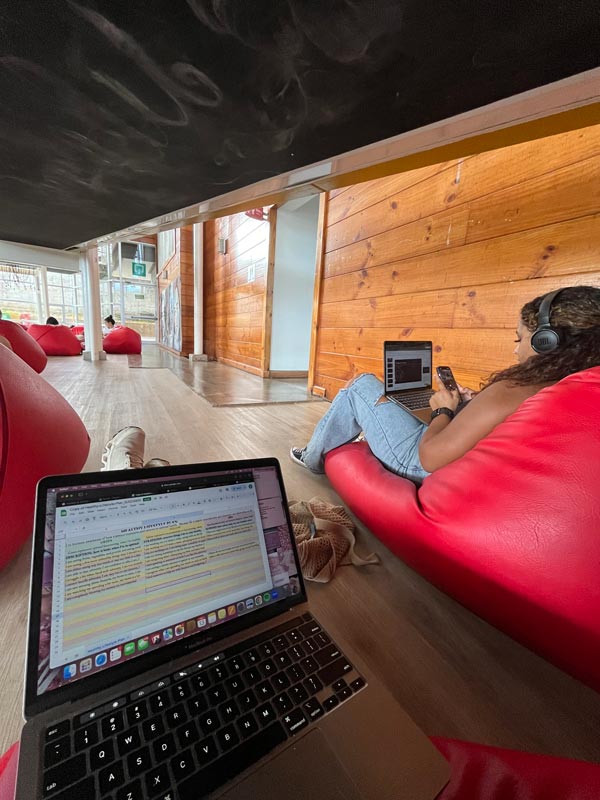
My friend Samirah and I working on our “Healthy Lifestyle Plan” for our Sustainable Lifestyles class.
The other class I am taking is “Holistic Health,” in which we learn alternative medical practices and compare them to conventional medicine. This class really has given me a new perspective on health and life in general. It also covers the topic of well-being, which is an overall theme here in Costa Rica. I am definitely learning a lot of self-improvement strategies.
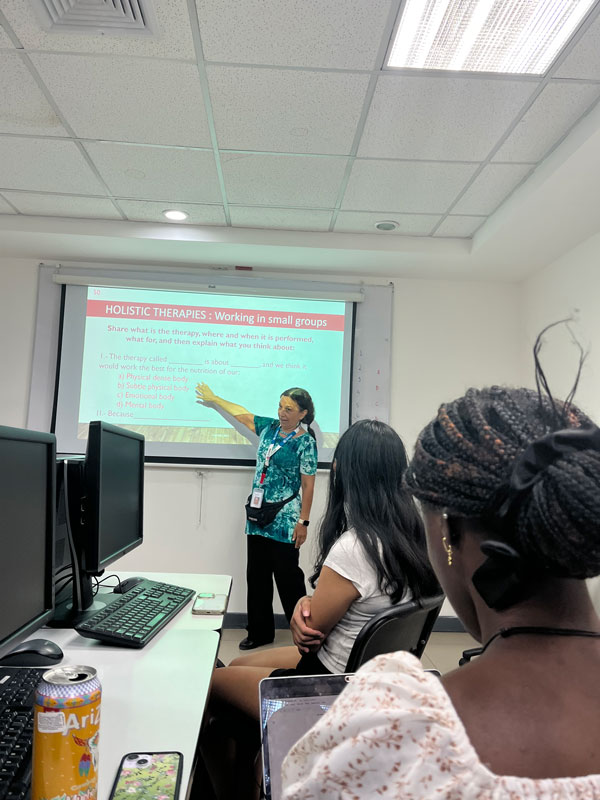
Our professor explaining an activity in which we discuss a certain holistic therapy with a group and prepare to present it to the class.
What is really cool about these elective classes is that we get to attend field trips on the weekends. For the “Sustainable Lifestyles” class, we spent one night visiting an Indigenous community. For “Holistic Health,” we get to visit another Indigenous community, explore a volcano, and take yoga classes. This allows one to really apply what they have learned in the classroom to real life.
While I do love exploring on the weekends, my weekdays are just as exciting! The classes you take abroad may be atypical compared to classes you would take at your home university, but the change and diversity is so refreshing! I am able to learn about topics that I am interested in that do not fall into the category of my major or general education credits. Studying abroad really allows one to dive deeper into their interests and creative side.











